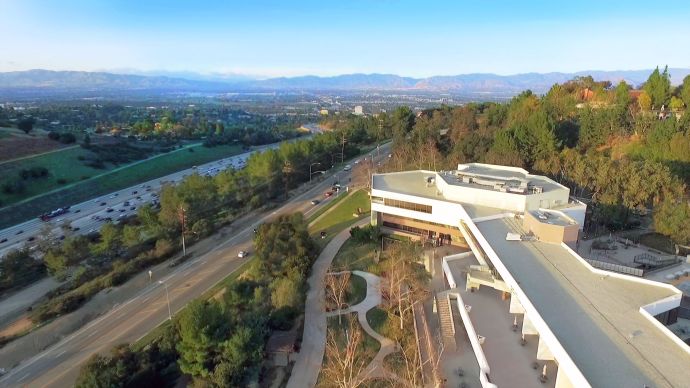The Jewish community of Los Angeles has grown in both size and diversity, the 2021 Study of Jewish LA found. Since the last comprehensive study of Jewish Angelenos in 1997, the number of Jewish households has increased by 25% to a total nearing 300,000.
Over 560,000 Jewish individuals live in these households in addition to approximately 180,000 gentiles. That so many non-Jews live in Jewish households is unsurprising given that 42% of married Jews in Los Angeles have non-Jewish spouses, according to the study’s summary of key findings.
Jews from outside of LA make up a significant part of the city’s Jewish community, with close to half of Jewish households featuring an immigrant or the child of an immigrant to the US. Nevertheless, only 6% of Jewish adults and 9% of Jewish children in Los Angeles are people of color.
This number is growing though, and the study estimates that the city’s Jewish community will become increasingly diverse in the future.
“The Los Angeles Jewish community is one of the most diverse and vibrant Jewish communities in the world,” Rabbi Noah Farkas, President & CEO of The Jewish Federation of Greater Los Angeles (JFGLA), said in a press release.

“The Study of Jewish LA will ensure that The Jewish Federation and all organizations working with the LA Jewish community have the data to be strategic, thoughtful, and help uplift our entire community,” he added.
“The Study of Jewish LA will ensure that The Jewish Federation and all organizations working with the LA Jewish community have the data to be strategic, thoughtful, and help uplift our entire community.”
Rabbi Noah Farkas
Community diversity
LA’s Jewish community is also diverse in terms of religious involvement. 23% of the city’s Jews are minimally involved in Jewish engagement, 27% celebrate some holidays, 16% celebrate holidays and engage in communal activities, 16% regularly engage in Jewish rituals and 17% are described as immersed in Jewish engagement.
Although only half of Jewish Angelenos identify with a particular denomination, the levels of engagement among this half fall along the entire spectrum.
Another interesting datapoint was that while over half of Jews in LA thought that being Jewish was important or extremely important, only one quarter lived in a household with a person who is a member of a synagogue.
Jews in LA seem to prefer other ways of identifying with and expressing their Judaism. For example, 65% feel attached to Israel, over half of adults between the ages of 22-30 frequently discuss Jewish topics daily and over a quarter of all Jews in the city mark Shabbat in some way.
In its takeaways, the study notes how diverse the Jewish community of Los Angeles is and recommends that Jewish programs should, accordingly, avoid a “one-size-fits-all” approach by targeting and acknowledging specific subgroups.
Moreover, deepening the engagement of intermarried families with Jewish education and institutions is essential to the maintenance of the community’s overall strength, the study asserted.
The study also stresses the need for support and enrichment of non-traditional Jewish organizations since hundreds of thousands of Jewish Angelenos do not identify with a denomination and do not belong to a synagogue.
Remote participation
Lastly, LA’s Jews have spread out geographically just as the rest of the city has, the release explains. Decentralized services along with remote participation options are therefore recommended.
“It is crucial that we, as a community, think about the complexities raised in the data, generate new questions to explore, and use these data to create actionable change,” Dr. Shira Rosenblatt, Associate Chief Program Officer of The Jewish Federation of Greater Los Angeles, reflected.
“Our goal is to inspire collaboration, creativity, and strategic thinking to address challenges and to leverage the strengths of our Jewish community. We strive to make the data accessible, inclusive, and action-oriented.”
Rabbi Farkas sees the complexities found in the study in a positive light. “We are excited by what this study shows about our growing diversity and what it means for the future of the Jewish world.”
